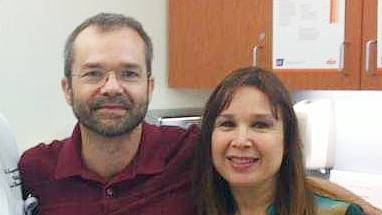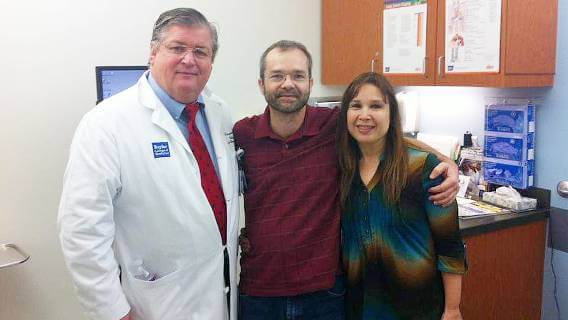Mesothelioma Survivor’s Treatment Journey Continues
Stories from SurvivorsWritten by Michael Cole | Edited By Walter Pacheco

My mesothelioma journey has been difficult at times, but I try to remain positive. I returned home from having mesothelioma surgery a week or so after getting out of the ICU. The five-hour trip home by car was insanely miserable.
Later we discovered a nonprofit organization that will fly people back and forth to Houston for treatment. I sure wish we had known about that sooner during our earlier adventures in Houston.
My wife had to go back to work. Money was tight, to say the least. My mother stayed with me during the day for a time. Honestly, I hardly remember that.
After a while, I took care of myself. At first that mostly entailed lying on the reclining couch, with little or no concept of time, trying to get up the willpower to make my next move. Like going for my required walk. Taking a shower. Or stretching that extra few millimeters to reach my water.
My wife did a lot of research on diet and supplements (something she continues to do). We don’t think there is some kind of “magic bullet” out there for mesothelioma, but we think that there are definitely things that help. Our doctors, the dietitians, etc. have been very supportive and helpful in that area, too.
When I returned to Houston to see Dr. David Sugarbaker, my surgeon, I remember him telling me something that has stuck with me. He said, “I’m so glad that you are doing well. So many of my patients just lay down and die. There is no medical reason for it. They just die. They give up.”
Back to Work After Mesothelioma Treatment
I returned to work as soon as I was able. I work for a nonprofit helping the less fortunate. We assist with the food bank, and with job training. It was not easy going back, but I firmly believe it was the right thing to do.
My reward for surviving the extrapleural pneumonectomy surgery was chemotherapy. I didn’t want it. Dr. Sugarbaker, though, told me if I did not do chemotherapy, he would not continue to treat me. I gave in. We arranged for me to get the treatment in Fort Worth.
I started chemotherapy about three months after the surgery. I was given rounds of cisplatin and Alimta. I was told that it would be between three and six rounds, depending on “what I could tolerate.”
I made it through four or five. By the time they said I’d had enough, I not only couldn’t remember how many rounds I’d had, I couldn’t remember much of anything else, either.
I know that when I had the chemotherapy, they had better drugs and more tools to manage the side effects than what they had only a few years earlier. That is probably true again now, about seven years after my chemotherapy.
Nonetheless, unless there is a very compelling reason, I will not do chemotherapy again if the hope is only for another year or two of life.
Benefits of Seeing a Psychiatrist
We went back and forth to Houston monthly, sometimes more often. I continued to recover. It seemed little-by-little to me, but others felt that I was progressing very well. It was during that time that Dr. Sugarbaker told me he wanted me to see a psychiatrist.
I was reluctant at first. I told him, “Doctor, I think I’m doing fine,” and he said, “Look, that surgery you had is the biggest bear on the planet, there is none bigger; and for you, the impact is like if you lost your job, your dog died and your wife left you, times 10,000. You get what I’m saying?”
So, I made an appointment with a Christian psychiatrist. I wasn’t sure one of those existed, but a friend directed me to this one. It was very worthwhile. He asked me why I came to see him, and I told him that my surgeon recommended it, and why. He explained how the trauma to the body interacts with brain function, resulting in a loop effect that tends to drive up stress, resulting in more pain, more stress.
He explained that it is just the way it is for everyone in that physical condition. The key is to recognize it and try to short-circuit the cycle. He asked how I handled my mesothelioma pain and stress, and I told him that basically I tried to avoid stress as much as possible, and to relax if my pain started going up. He said that it was the right thing to do and encouraged me to continue managing my pain and stress naturally, if possible.
He told me that if I felt like I needed additional help in the future, he would be glad to help me. There are medications that can help manage the situation, if necessary. Since that time, I have in fact used some medication to help. It became almost impossible for me to sleep (possibly because of stress at work), and I began using a mild medication.
Finding Treatment for Tumor Recurrence
I was told that if the mesothelioma recurred, it would likely recur within two years. There were not many examples of people living past two years with pleural mesothelioma, but for of those who did, chances were good of living considerably longer. I was checked several times for the first two years.
At the two-year mark, they found cancer in several spots. Surgery to remove the spots was planned. It was expected to be relatively quick and simple. It turned out that the cancer was more extensive than first thought.
It had infested the underside of some of the remaining ribs on my right side, and the intestine was stuck to the ribs. This would require another surgeon to be called in to assist in the surgery. Part of the intestine had to be removed as well as the ribs and the other spots.
The next scan showed more cancer spots, including in some lymph nodes. Surgery was no longer an option.
Immunotherapy Combination Has an Effect
In 2018, I began seeing a medical oncologist and getting immunotherapy at Baylor College of Medicine. I was told there were not many case studies using it on mesothelioma, and the results were all over the place. I was assured that it was not uncommon with that small a sampling.
Based on my previous experience with chemotherapy, I was a little nervous about what the side effects would be with immunotherapy. Thankfully, for me at least, the side effects were, and are, very mild.
Dr. Sugarbaker told us that there was evidence to indicate that targeted radiation therapy, coupled with the immunotherapy, could be beneficial. He recommended that we contact a specific radiation oncologist at MD Anderson in Houston, with whom he was collaborating.
We noticed during that time that Dr. Sugarbaker did not look well. He told us, “They will tell you I’m not well, but don’t listen to them.” We contacted the doctor at MD Anderson, and she began treating my cancer spots with targeted radiation. Radiation is not fun, but it is bearable. The combination of targeted radiation and immunotherapy had an effect.

My tumors didn’t go away, but growth slowed to a comparatively glacial pace. New tumors appeared less frequently. We fell into a rhythm of immunotherapy monthly and radiation yearly. A year or so later, we were deeply saddened when we heard that Dr. Sugarbaker had died.
In 2020, we began having all of my treatment done at UT Southwestern in Dallas. It took about a year to get my insurance to approve it, but I had a new type of radiation done on my tumors in late 2020, early 2021.
The treatments are designed with the intent of reducing collateral damage and increasing effectiveness. Some of my tumors shrunk by around half, and there has been no growth and no new tumors since that time. I continue to have immunotherapy once per month.
With Mesothelioma at Bay, Future Looks Bright
For now, my mesothelioma is under control. I’ve had no tumor growth or new tumors in over a year. We are continuing with immunotherapy. This is really, in a sense, uncharted territory. We don’t want to rock the boat.
I am now being treated at Texas Oncology. The insurance company didn’t want to continue paying for me to have treatments at UT Southwestern. I’m satisfied with my treatment at Texas Oncology, as I have been with my treatment everywhere that I have been treated.
I have had to take some time off here and there, but overall, I have continued to work full time. I have been very blessed. I can’t thank all the people enough who have helped me.
I have left out much of this story, but I hope this is helpful to those who may be facing similar situations. I would encourage those with cancer to live minute to minute, day by day.
Just keep putting one foot in front of the other, the best you can. And do your best to find something good and appreciate it – all the time.




